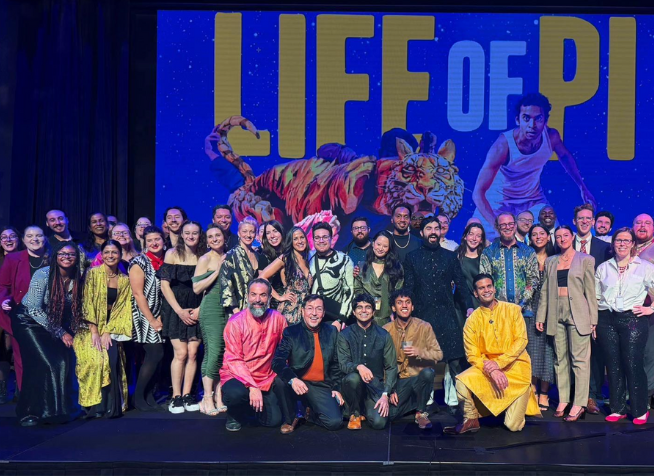Can you tell us about your character?
Pi is such a fascinating character to bring to life—he’s a vibrant, curious, and unbelievably resilient young man. One of the things I love most is how you see him unfold throughout the story, revealing all these different dimensions of himself: he’s wary when you first meet him, but has an ocean of curiosity just under the surface that bubbles to life; he can be wise beyond his years, but still naive and mischievous as teenage boys tend to be; finally, he holds such a deep love for his family and takes solace in his unique spirituality. Despite the peril and tragedy of his circumstances, he finds a way to be hopeful and reflective through the memory of his loved ones, which makes his journey that much more compelling. That entire arc—watching him grow, struggle, and ultimately survive—really captures what it means to be human, and it’s a privilege to share his story each night on stage.
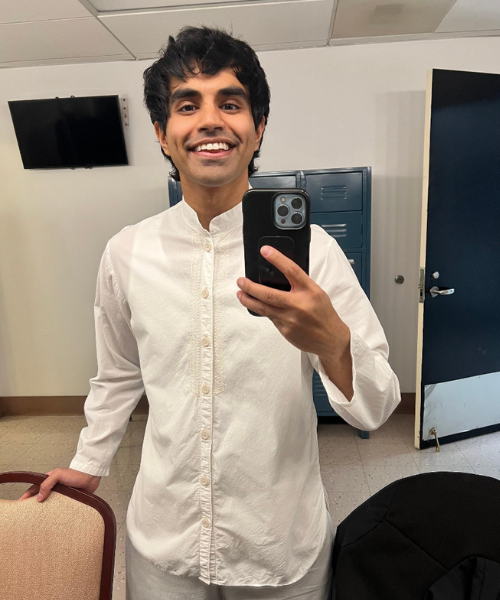
Taha as Pi— Baltimore, Hippodrome Theater
How was the rehearsal process?
Rehearsals felt surreal at first, because I still had fond memories of watching my friends perform this role on Broadway, so there was definitely a joyful adjustment period as I made it my own. It was a layered process: initially, we focused on the technical side— learning the show’s automation, puppetry, and design, often without having all the set pieces right there. Because many of the cast were new to puppetry, technical specificity of puppet work and scene changes took up most of the early rehearsals. Suffice to say, it was some of the most physically/ mentally demanding work to date for many of us.
Once we grew more confident, we shifted to finding our flow as a company. We’d sometimes split up—puppetry team in one room led by the incredible Scarlet Wilderink (associate puppet & movement director), the rest of us doing scene work with our wonderful director, Ashley Brooke Monroe, in another—then reunite to piece it all together. The teamwork and collaboration between Ashley, Scarlett, and Jon Hoche (our touring director) as our creative team deserves exceptional praise. It’s a huge undertaking, and we’re still getting settled, but rehearsals were an exciting journey.
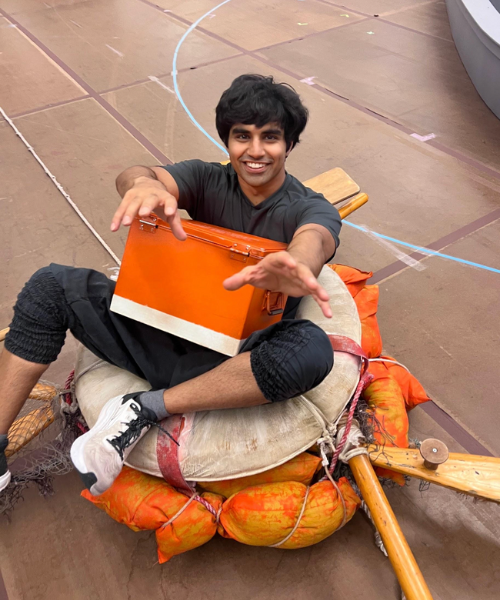
Taha at Pi rehearsals, New 42 Studios, NYC
Is it difficult to perform opposite a puppet?
Honestly, it’s not difficult at all—it’s pure magic in motion. Even though the puppeteers are right there in plain sight, their incredible coordination makes them almost vanish, leaving a fully alive creature in front of you. It’s really exciting to play off that energy, and it keeps you on your toes because you never lose that sense of wonder at what’s unfolding right before your eyes.
How is life on the road?
It’s definitely been a learning experience condensing my whole life into a couple of suitcases, but also really rewarding—I’m figuring out how to simplify and focus on what truly matters. DC has been a highlight so far, partly because my in-laws and friends are nearby, which means plenty of warm company, plus those incredible national museums and historic architecture. I’m honestly excited about every city we’re hitting, especially the ones I’ve never been to before—I love the thrill of exploring somewhere new. And I can’t wait for our Cincinnati stop in February. That’s going to be a sweet homecoming for me, with my friends and artistic community finally getting to see the show in person.
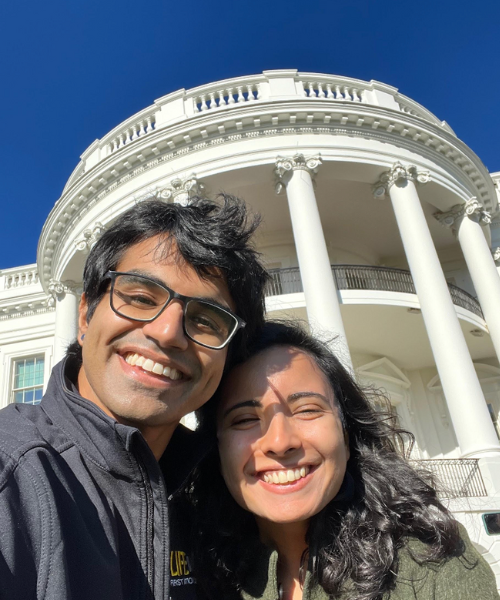
Taha and his wife, Minahil, at the White House!
What is your pre-show warmup?
If the show’s at 8pm, I usually start getting into gear around 4pm with a light mobility session and a quick mile or two on the treadmill—just enough to warm up and get my head in the zone. Around 5pm, I’ll have a light, protein-packed meal, then at 6:45, we have our fight/lift safety call that runs about half an hour. After that, I’ll spend 15 to 20 minutes doing a vocal warmup in my dressing room while I get ready. Finally, about five minutes before places, the cast all circles up to connect, share positive vibes, and get into the right headspace together before heading onstage. It’s a nice mix of physical prep, vocal work, and team bonding that really sets the tone for the show.
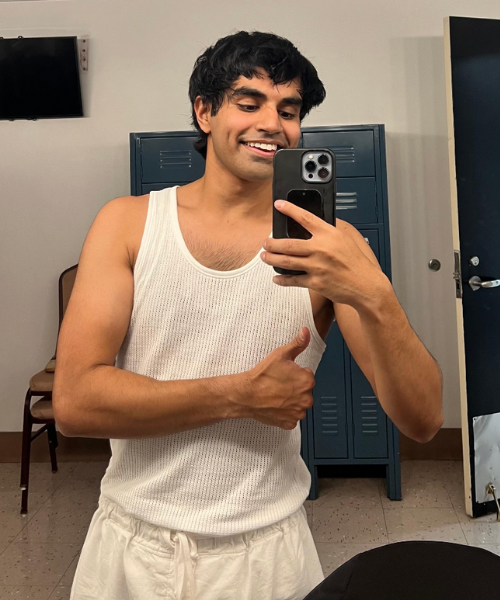
Taha as Pi— Baltimore, Hippodrome Theater
Do you have a favorite moment in the show?
It changes from night to night, because I’m onstage for almost the entire show and there’s so much room to explore and experience new things each performance. Right now, though, my favorite has to be the transition into the market—there’s this incredible burst of color and music that unfolds gradually, yet vibrantly. It’s a really magical moment that genuinely fills me with so much joy.
Where are you from and where did you train as a performer?
I’m culturally from Pakistan, but I grew up as a first-generation American in a small town called London, Kentucky from an early age all through high school. I actually started off at the University of Kentucky intending to go to medical school, but gradually found my way into theatre and stage combat, eventually switching my major. After graduating, I did an acting internship at Cincinnati Playhouse in the Park, which really jumpstarted my professional acting journey.
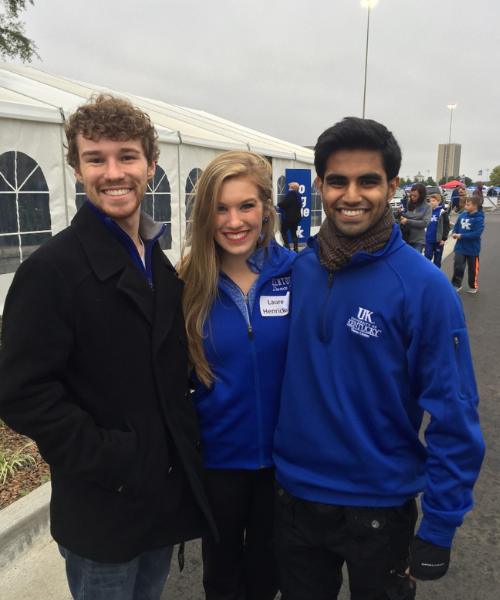
Taha with Hunter Henrickson and his sister, Lauren Parker at the University of Kentucky (2015)
How did you get into performing?
It was definitely a gradual journey shaped by the right people at the right time. Growing up, I spent a ton of time outdoors, letting my imagination run wild and diving into all kinds of fiction and stories— though most of my curiosity was aimed at the sciences. I also did martial arts as a kid, which helped me transition into stage combat later on. My first amateur role was Nico the Head Flying Monkey in my high school’s production of The Wizard of Oz—my friends pressured me into it, and I’m so glad they did, because it lit a spark in me that only grew from there.
Things really started changing in college when I saw my best friends, Hunter Henrickson and Noah Berry, perform. Watching their shows piqued my interest in theatre and expression, so I took a class with Dr. Christina Ritter at the University of Kentucky. Around the same time, Andrew Dylan Ray—“A-Ray”—introduced me to stage combat through the Society of American Fight Directors, and suddenly I realized I could merge my love of physicality from martial arts with performance. By that point, I was hooked.
My first paid show was in the outdoor drama Unto These Hills in North Carolina, and from there, I never looked back. It didn’t happen all at once— just a steady unfolding and discovery of parts of me that needed to be explored, and I’m grateful every day for the people who guided me along the way.
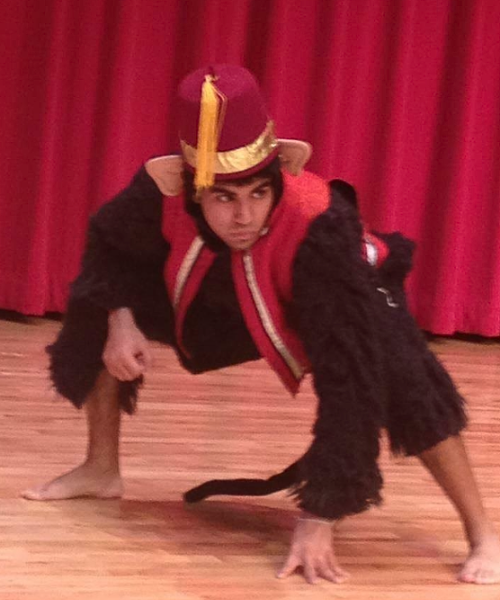
Taha as Nico the Flying Monkey - The Wizard of Oz, South Laurel High School, 2012
What advice would you give to aspiring performers?
I’d say performance is a balance between playfulness and professionalism—two sides of the same coin. On one hand, you need to nurture your inner child: be curious, unafraid to make mistakes, and open to trying new things. That spark of imagination keeps you from getting stale and allows your creativity to shine. Also, take ample time to learn/ observe from people whose acting you admire. On the other hand, you need a solid bedrock of professionalism: learn your lines, show up on time, and treat everyone—cast, crew, and creatives—with respect. You’d be surprised how often these basics get overlooked, but mastering them early on will make all the difference in building a successful and fulfilling career.
Is this your first time performing at Playhouse Square? Ever been to Cleveland before?
Actually, this isn’t my first time in Cleveland! Back in 2019, I performed in two Great Lakes Theater productions—Taming of the Shrew and Witness for the Prosecution. I was also set to do Much Ado About Nothing in March 2020, but the pandemic shut everything down. So, coming back now really feels like a full-circle moment for me, getting to reclaim performing in Cleveland after COVID, especially here at Playhouse Square. It’s exciting to be back in this city with all its rich theater history.
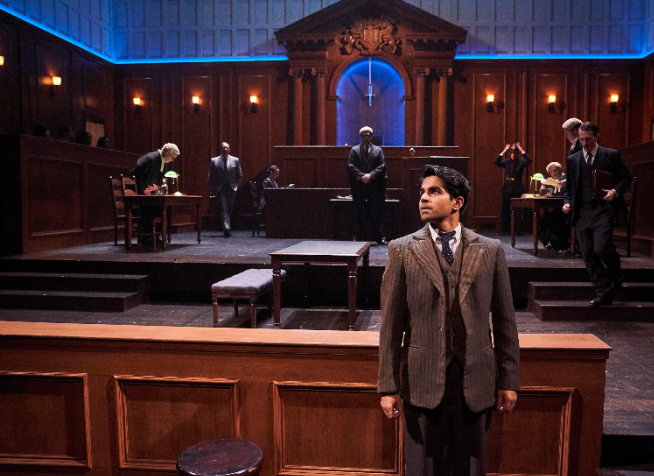
Taha as Leonard Vole in Agatha Christie’s Witness for the Prosecution at the Hanna Theater, Cleveland (Great Lakes Theater, 2019)
Why should audiences come and see Life of Pi?
Life of Pi is one of those rare shows that truly offers something for everyone. It’s visually breathtaking thanks to the ingenious puppetry and stage/ lighting design, and Pi’s story of resilience and faith resonates in such a personal way. What’s really fascinating is how audiences in each city respond differently—some feel moved by the spiritual arc, others get swept up in the spectacle and movement, and many walk away reflecting on their own strength and sense of wonder. It’s not just another night at the theater; it’s an unforgettable experience that sparks conversations long after the curtain falls.
